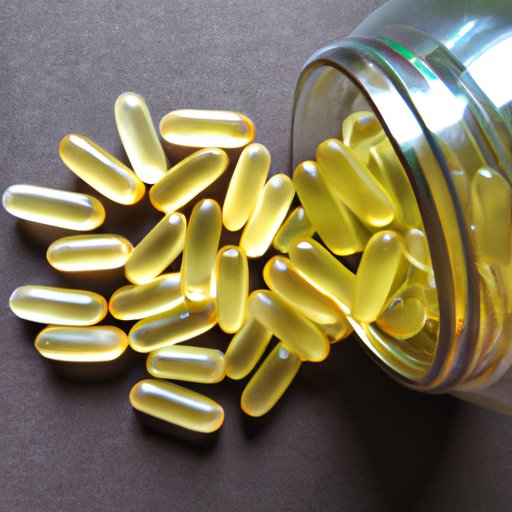
Introduction
Vitamin D is a crucial nutrient for maintaining good health. It plays a role in everything from bone health to immune system function. But with conflicting advice and varying recommendations, it can be difficult to know how much vitamin D to take daily. In this article, we will explore the benefits of vitamin D, recommended dosages, and tips on how to get enough vitamin D from natural sources.
The Benefits of Vitamin D: How Much is Enough?
Vitamin D is essential for the body to absorb calcium and promote bone growth. It also plays a role in muscle function, immune response, and reduces inflammation. Studies have shown that low vitamin D levels are linked to an increased risk of several diseases, including osteoporosis, heart disease, and certain cancers.
The recommended daily intake of vitamin D varies based on age, gender, and other factors. The National Institutes of Health recommends the following:
- Infants 0-12 months: 400-1000 IU
- Children 1-18 years: 600-1000 IU
- Adults 19-70 years: 600-800 IU
- Adults over 70 years: 800-1000 IU
Should You Be Taking a Vitamin D Supplement?
While vitamin D can be found in some foods and the body can produce it from exposure to sunlight, some people may need to supplement their diet with additional vitamin D. These include:
- Those who live in regions with limited sunlight
- People with darker skin
- Those who avoid the sun or use sunscreen regularly
- People with certain medical conditions that affect vitamin D absorption
The recommended daily dosage of vitamin D supplements varies depending on individual needs. It is best to consult a healthcare provider or registered dietitian to determine the appropriate dosage.
Understanding Vitamin D Dosage: What the Research Says
The latest scientific evidence shows that the recommended daily dosage of vitamin D may need to be higher than originally thought. In November 2010, the Institute of Medicine (IOM) released new guidelines for vitamin D intake, recommending that the daily intake for most adults should be 600-800 IU.
However, many experts believe that the IOM’s recommendations are too low. Some studies suggest that a daily intake of 1000-4000 IU may be necessary to maintain optimal levels of vitamin D in the blood. It is important to note that vitamin D toxicity can occur at high doses, so it is imperative to consult a healthcare provider before taking any vitamin D supplements.
How to Get Enough Vitamin D – Without Overdoing It
While supplements may be necessary for some individuals, getting enough vitamin D from natural sources is always the best option. Foods that contain vitamin D include fatty fish, egg yolks, and fortified foods like milk and cereal. Many brands of orange juice and yogurt are also fortified with vitamin D.
Another way to naturally increase vitamin D intake is through sun exposure. The body produces vitamin D from direct sunlight on the skin. However, it is important to avoid overexposure to the sun, as this can lead to skin damage and increase the risk of skin cancer. Experts suggest spending 5-30 minutes in the sun without sunscreen, several times per week, depending on skin type and location.
Vitamin D: The Dos and Don’ts of Daily Intake
When it comes to taking vitamin D, there are some best practices that can help ensure optimal levels and avoid risks of toxicity. These include:
- Consulting a healthcare provider or registered dietitian before starting any vitamin D supplement
- Avoiding megadoses of vitamin D, which can lead to toxicity
- Getting vitamin D from natural sources as much as possible
- Being cautious about sun exposure
Conclusion
Vitamin D is an essential nutrient for maintaining good health, but it can be difficult to know how much to take. By understanding the benefits of vitamin D, recommended daily dosages, and tips for getting enough vitamin D from natural sources, individuals can make informed decisions about their vitamin D intake. It is important to always consult a healthcare provider or registered dietitian before starting any supplements or making dietary changes.





